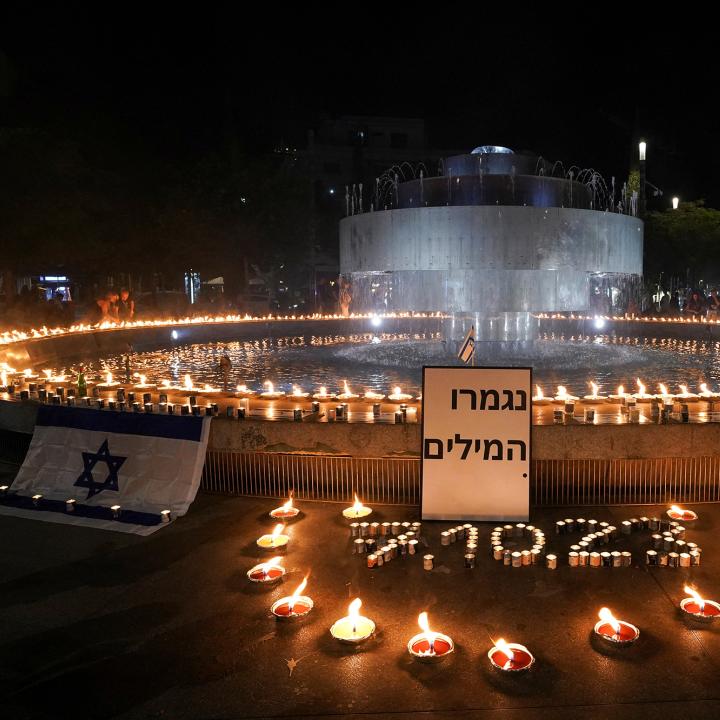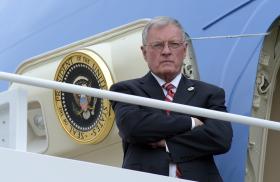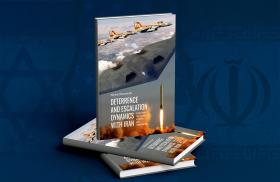
- Policy Analysis
- PolicyWatch 4115
October 7, Two Years On: Repercussions for Israel, the Middle East, and U.S. Policy

An Emirati official and an Israeli expert join two former U.S. officials to discuss the ongoing aftershocks of the Hamas attack, including the revised prospects for peace amid the Trump administration's new diplomatic push.
On October 6, The Washington Institute held a virtual Policy Forum with Yossi Klein Halevi, Ali al-Nuaimi, Dana Stroul, and Dennis Ross. Halevi is a senior fellow at the Shalom Hartman Institute in Jerusalem. Al-Nuaimi is a member of the UAE’s Federal National Council, where he chairs the Defense Affairs, Interior, and Foreign Relations Committee. Stroul is the director of research and Kassen Senior Fellow at The Washington Institute and former deputy assistant secretary for the Middle East at the Pentagon. Ross, the Institute’s Davidson Distinguished Fellow, has served in senior White House positions in multiple Democratic and Republican administrations. The following is a rapporteur’s summary of their remarks and is not to be cited as direct quotations of the participants.
Yossi Klein Halevi
For Israelis, the events of October 7 led to two key conclusions: there is no conceivable way the public will agree to a two-state solution, and Palestinians and Israelis cannot live as one political entity. Any future political discourse on Israeli-Palestinian relations will revolve around these two somewhat contradictory takeaways.
Initially, the Israeli offensive in Gaza City appeared to be the wrong move. Yet the campaign has exerted visible pressure on Hamas and Arab leaders to accelerate efforts to end the war. The hostage families have been particularly effective in mobilizing public sympathy and international attention. Through a mix of desperation and strategic flattery, they persuaded President Trump that only he, not Prime Minister Binyamin Netanyahu, could free the hostages. This direct appeal prompted Trump to take a deeply personal interest in the issue, aligning his intervention with Israel’s ongoing military pressure. Both forces—American diplomatic involvement and Israeli military action—appear to have functioned symbiotically to bring the ceasefire negotiations to their current stage. Netanyahu was unlikely to end the war without direct pressure from the White House; by intervening, Trump provided him with an exit strategy.
At the same time, if negotiations in Egypt lead to hostage releases and a lasting ceasefire, Israel’s internal political divisions will likely deepen. Key members of Netanyahu’s cabinet, including Itamar Ben-Gvir and Bezalel Smotrich, are expected to position themselves in opposition to the prime minister ahead of potential early elections. For his part, Netanyahu will likely seek to capitalize on the moment by calling for elections as soon as possible, hoping to campaign on the success of a deal that, as he said at the White House last week, achieved his government’s war aims. Yet it is highly unlikely that Israel can begin the process of national recovery, reconciliation, and reckoning if it is governed by a coalition like the current one.
Looking ahead, Arab leaders must make a concerted effort to engage directly with the Israeli public as part of any postwar strategy. For Israel, the path forward requires a gradual conceptual shift—away from the mindset of annexation and toward a pragmatic framework with the Palestinians that can, over time, lay the groundwork for a different approach in which there is not a single entity governing both peoples.
Ali al-Nuaimi
The Abraham Accords represent more than diplomatic normalization. From the outset, Abu Dhabi envisioned full regional integration—embedding Israel into the Middle East through genuine engagement and people-to-people diplomacy. In the UAE, Israelis are not only accepted but welcomed by both the government and society. Although the UAE disagrees with many of the current Israeli government’s policies, it has rejected the regional norm of expressing displeasure by withdrawing ambassadors or closing embassies. Instead, it has remained committed to engagement, believing that Israel’s integration strengthens both the UAE’s security and the region’s collective stability.
Accordingly, the UAE continues to support the Palestinian cause while maintaining connections with the Israeli public, emphasizing that governments may change but relationships between peoples must endure. From Abu Dhabi’s perspective, Israel’s security is a regional imperative that can only be achieved through private and public sector partnership. The goal is for Israel to move beyond viewing the region solely through a security lens. Instead, it should adopt a perspective of partnership and shared responsibility—an approach that can transform the region, enabling all peoples to experience security, peace, and prosperity.
While recognizing Israel’s military achievements against Hezbollah, Syria, and Iran, the UAE cautions that such victories must be translated into political progress—otherwise, they risk perpetuating a cycle of conflict. The UAE also views President Trump’s leadership over Middle East diplomacy as an opportunity to address the Gaza issue, revitalize peace efforts, and, eventually, expand the Abraham Accords. Yet Abu Dhabi is concerned that Israel’s growing isolation has damaged its global image and made its citizens feel increasingly unwelcome abroad. To counter this, it urges deeper engagement across civil society, the private sector, and faith communities.
Looking ahead, the UAE seeks to convince the Israeli public that regional integration offers the most secure and prosperous future. Disarming Hamas, once solely an Israeli demand, has become a shared regional priority linked with commitments to peace and a two-state solution. This goal is important to Emirati security, not just Israeli security. Thinking about future security arrangements in Gaza, Abu Dhabi envisions Palestinian security forces being trained in Egypt and Jordan to assume responsibility for internal security, with Arab and Muslim forces securing borders and supporting reconstruction.
Dana Stroul
There is cautious optimism surrounding current ceasefire negotiations. After two years, broad global consensus has emerged behind several key goals: freeing the hostages, disarming Hamas, flowing aid into Gaza, and moving in a new political direction. Arab and Muslim governments are now aligned with the United States and Israel in supporting Trump’s twenty-point plan, with Turkey joining Qatar and Egypt in applying pressure to Hamas. This is a significant change from previous diplomatic efforts, when stakeholders intentionally tried to avoid negotiating in front of a global audience and limited talks to a small group. Still, Hamas appears to be sticking to its prior playbook, issuing statements that suggest openness to releasing the hostages only to bog down subsequent talks. Various implementation details remain sticking points, such as whether Hamas can deliver all the remaining hostages, how humanitarian aid will flow into Gaza, and the lines of Israel’s withdrawal.
Regarding U.S.-Israel relations, certain aspects have proven resilient while others face growing vulnerabilities. The U.S.-supported regional security architecture has remained largely stable—the American diplomacy that enabled the Egypt-Israel and Jordan-Israel peace treaties and, later, the Abraham Accords continues to underpin stability. Following October 7, U.S.-Israel military cooperation deepened, aided by Israel’s integration into U.S. Central Command, the signing of the Abraham Accords, and strong executive branch support (e.g., assistance from U.S. military stockpiles; a strengthened U.S. military posture in the region). At the same time, however, strong bipartisan congressional support for Israel is eroding, and as younger generations increasingly question the relationship, future presidents are unlikely to match the stout pro-Israel stance shown by Biden and Trump. Additionally, continued military assistance and arms sales to Israel face scrutiny, and diplomatic capacity is constrained by unfilled ambassadorships and senior posts in Washington.
Regionally, integration efforts face strain after Israel’s strike in Doha, which some partners viewed as a direct attack on Qatar rather than a strike on Hamas. Repairing regional ties will require leadership in Jerusalem, Washington, and across the Arab world, along with a credible vision for Gaza’s “day after.”
Trump’s renewed involvement in ceasefire negotiations could revive progress if paired with a consistent focus and a capable team of experts, diplomats, and support staff to finalize details. Success will depend on concrete implementation—defining contributors, timelines, and aid mechanisms. Arab leaders should sustain dialogue not only with the Israeli public, but also with members of Congress. Ultimately, lasting stability will depend on both interfaith engagement and a broader partnership between civil society organizations and government efforts to marshal a conceptual shift across the region.
Dennis Ross
President Trump’s Gaza plan, particularly its “day after” component, builds on a framework first developed under the Biden administration. It envisions four central pillars: a regional and international council chaired by a credible global figure to oversee governance; a day-to-day administrative body led by technocratic Palestinians unaffiliated with Hamas or the Palestinian Authority; an international stabilization force to ensure security; and a reconstruction process tied directly to disarmament, as no country will invest in Gaza if Hamas retains the ability to rearm and reconstitute itself.
The plan rests on two core conditions: Hamas must be militarily defeated, and a viable alternative to its rule must be established before the war can end. Facing differences over the PA’s role, the Biden administration did not push hard enough or soon enough to reach agreement on such a framework. Netanyahu was opposed to any PA role, while different Arab leaders wanted at least some PA participation, at times emphasizing the need for genuine reform if it was to assume responsibility for governance after the transition period. Lacking a decisive push, Washington was unable to conclude an agreement before last November’s election. Although a partial hostage and ceasefire deal was finalized just before President Trump took office, Netanyahu refused to advance to the agreement’s second phase, and Trump seemingly gave him license to go for a military victory.
Yet the timeline on that license was not forever—Trump is now exerting pressure on Netanyahu as well as Arab leaders, leveraging his political capital to finalize a hostage release and end the war. It has become increasingly clear that Netanyahu cannot say no to the president: he resumed humanitarian aid after Trump said there was starvation in Gaza (something Netanyahu had previously denied); he called back Israeli aircraft about to respond to an Iranian missile launch after the ceasefire was to go into effect; and he apologized to Qatar’s prime minister for the Doha strike. Arab government alignment with Trump’s efforts to end the war no doubt played a role in such decisions. Yet key challenges remain, especially the implementation and verification of Hamas’s disarmament, which is directly tied to Israel’s military withdrawal from Gaza.
Going forward, safeguarding the Palestinian population will be essential, and Israel must undertake a serious effort to repair its global image—something the current government is ill-equipped to achieve. Lasting progress will depend on sustained U.S. engagement, backed by a dedicated team of diplomats, security experts, and legal advisors to ensure a path toward peace.
This summary was prepared by Sarah Boches. This Policy Forum was made possible through the generosity of the LSP Family Foundation.






